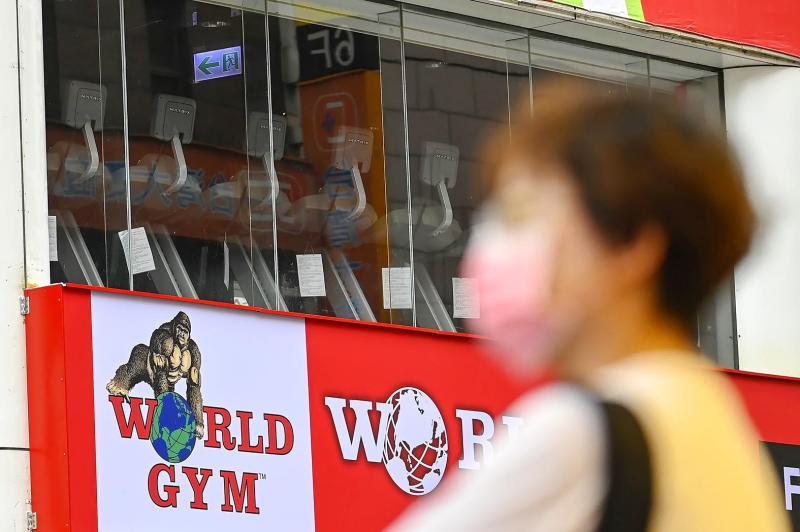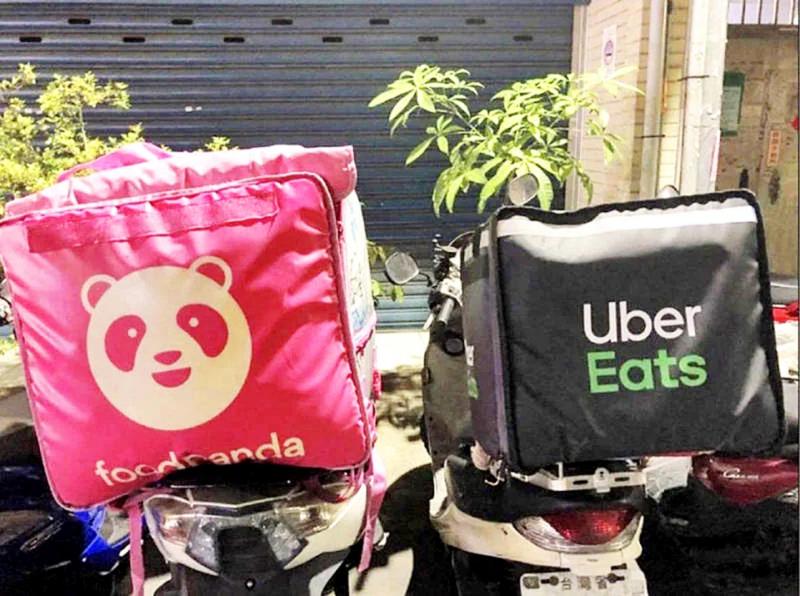Over the weekend, among expatriate circles, a report by the Central News Agency (CNA), which stated that individual foreign residents — unlike Taiwanese citizens — wouldn’t be eligible for one-off cash handouts of NT$3,000 to NT$6,000 if they were encountering financial difficulties as a result of the COVID-19 outbreak, caused some dismay and a good amount of annoyance.
Foreigners who’ve been living and paying taxes in the capital for years felt aggrieved and excluded. And all for no reason, it seems: Tom Chou (周台竹), commissioner of the Taipei Mayor’s Office for External Affairs, on Monday said: “We won’t exclude a foreign individual, so long as he or she pays tax to the central or local government.”
He then qualified his words, mentioning the need to coordinate with and await guidance and regulations from the central government.

Photo: Chen Chih-chu, Taipei Times
SUBSIDIES FOR FOREIGNERS
Taipei Mayor Ko Wen-je’s (柯文哲) plan to shore up the capital’s economy, dubbed the Nine Major Relief Measures (9大紓困措施) includes assistance for local businesses as well as individuals suffering a loss of income.
“A foreigner who has established a company in Taiwan, and who pays taxes to Taipei City Government, such as property taxes or license fees, is eligible to apply for help. They can contact the city’s Department of Finance for details,” Chou said, sounding confident.

Photo: Luo Chi, Taipei Times
Carrie Kellenberger, a former chairwoman of the Canadian Chamber of Commerce in Taiwan who with her husband runs Reach To Teach Recruiting, said: “We’ve been business owners here for over 10 years. We provide good jobs to locals as well as foreign talent, and have worked closely with the government here to provide teachers for education programs. If our business isn’t eligible for any kind of assistance, it’d be just so sad. We’re also trying to assist a lot of teachers who are in crisis right now.”
Marcus (not his real name), an English teacher from South Africa, is among the foreign residents who say they’d really benefit from some official assistance. His employer, the cram school through which he obtained his Alien Resident Certificate, has suspended classes, leaving him without an income.
Speaking to the Taipei Times before Chou had issued his clarification, Marcus said: “I’ve saved some, and my friends are helping, but that subsidy would really have been nice.”
“Basically, I am screwed,” lamented another teacher. “I had three part-time jobs, and they all shut down because the government mandated it.”
He added that his bosses still hadn’t figured out how to do online teaching, even though they’d like to implement it. “Luckily my housemate gave me two months’ rent in advance, but I don’t know what I’m going to do when that runs out,” he said.
According to the CNA report, a city-funded subsidy of up to NT$7,000 for those quarantining, self-isolating, or quarantining with a family member in a hotel also excludes foreigners, even those with residency. However, foreign residents can still apply for a NT$1,000 per day payment from the central government during quarantine.
If the Taipei City Government does as Chou says it will, and provides assistance and subsidies to every qualifying legal resident, citizen or not, it’ll help to break a long-established pattern common to central and local government, in which services are sometimes denied to non-citizens whose tax dollars help pay for those programs.
Last summer, as the Taipei Times reported, some long-term foreign taxpayers expressed consternation when the central government excluded from its Triple Stimulus Voucher Program foreign residents not currently married to local citizens. Four months later, the government relented, and sent out vouchers to holders of Alien Permanent Resident Cards (APRC) who’d missed out first-time around, as well as foreigners with diplomatic identification cards.
Foreigners who live and work in Taiwan and obey the law often find the door closed when it comes to government social programs. The country’s National Health Insurance is greatly appreciated by many non-citizens, but foreigners who’ve obtained permanent residency aren’t eligible for unemployment benefits. That said, foreigners who are dependent spouses of Taiwanese citizens, and who hold joining-family resident visas, do qualify.
HOUSEHOLD REGISTRATION SYSTEM
Because non-citizens are never independently listed on household registration documents, they miss out.
“The household registration system is the basis for many local government benefits, and that structurally disqualifies foreigners from some benefits,” says Michael Fahey, an associate at the Taipei law firm of Winkler Partners who is familiar with these issues.
Taipei City Government offers kindergarten subsidies that foreign children are effectively excluded from because they don’t have and cannot obtain household registration, he points out. For children aged two to four years attending legally-registered private kindergartens in the capital, the subsidy is NT$13,660 per semester, so long as the income of parents or guardians doesn’t exceed a certain amount.
According to Fahey, regulations in New Taipei make it more difficult for parents of non-citizen children to enroll their kids in public kindergartens.
Citizens enjoy definite advantages at the National Palace Museum, which is a unit of the central government.
On weekdays, Taiwanese aged 65 and above can enter for free. On weekdays, they only need to pay NT$75. Taiwanese and APRC holders of any age can buy tickets discounted to NT$150. Foreign tourists and those with non-permanent residency, however long they’ve lived in Taiwan, have to shell out NT$350 to see the treasures of ancient China.
There has been some progress, however. Since November last year, foreigners aged at least 65 with APRCs have been eligible to apply for the same type of EasyCard as local senior citizens. Each card provides 480 points per month which the holder can use to ride the metro, buses or YouBikes, or for admission to swimming pools and city venues.
On its Web site, the European Chamber of Commerce Taiwan described this reform as “a major breakthrough for long-term senior foreign residents of Taipei. It has been achieved thanks to many years of advocacy by the ECCT’s Better Living committees to grant equal treatment to legal foreign residents of Taiwan and the efforts of Taipei City Mayor Ko and officials in the Taipei City Government.”

The Taipei Times last week reported that the rising share of seniors in the population is reshaping the nation’s housing markets. According to data from the Ministry of the Interior, about 850,000 residences were occupied by elderly people in the first quarter, including 655,000 that housed only one resident. H&B Realty chief researcher Jessica Hsu (徐佳馨), quoted in the article, said that there is rising demand for elderly-friendly housing, including units with elevators, barrier-free layouts and proximity to healthcare services. Hsu and others cited in the article highlighted the changing family residential dynamics, as children no longer live with parents,

It is jarring how differently Taiwan’s politics is portrayed in the international press compared to the local Chinese-language press. Viewed from abroad, Taiwan is seen as a geopolitical hotspot, or “The Most Dangerous Place on Earth,” as the Economist once blazoned across their cover. Meanwhile, tasked with facing down those existential threats, Taiwan’s leaders are dying their hair pink. These include former president Tsai Ing-wen (蔡英文), Vice President Hsiao Bi-khim (蕭美琴) and Kaohsiung Mayor Chen Chi-mai (陳其邁), among others. They are demonstrating what big fans they are of South Korean K-pop sensations Blackpink ahead of their concerts this weekend in Kaohsiung.

Taiwan is one of the world’s greatest per-capita consumers of seafood. Whereas the average human is thought to eat around 20kg of seafood per year, each Taiwanese gets through 27kg to 35kg of ocean delicacies annually, depending on which source you find most credible. Given the ubiquity of dishes like oyster omelet (蚵仔煎) and milkfish soup (虱目魚湯), the higher estimate may well be correct. By global standards, let alone local consumption patterns, I’m not much of a seafood fan. It’s not just a matter of taste, although that’s part of it. What I’ve read about the environmental impact of the

Oct 20 to Oct 26 After a day of fighting, the Japanese Army’s Second Division was resting when a curious delegation of two Scotsmen and 19 Taiwanese approached their camp. It was Oct. 20, 1895, and the troops had reached Taiye Village (太爺庄) in today’s Hunei District (湖內), Kaohsiung, just 10km away from their final target of Tainan. Led by Presbyterian missionaries Thomas Barclay and Duncan Ferguson, the group informed the Japanese that resistance leader Liu Yung-fu (劉永福) had fled to China the previous night, leaving his Black Flag Army fighters behind and the city in chaos. On behalf of the